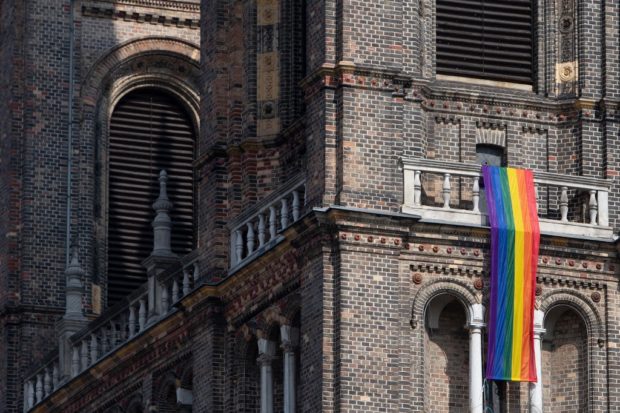Austrian Catholics fly rainbow flag after same-sex blessing ban

A LGBT rainbow flag hangs from on the steeple of the parish church in the Breitenfeld quarter in Vienna, on March 25, 2021. The Catholic church of the parish of Hard is one of many in Austria which decided to fly the rainbow flag in solidarity with the LGBT community after the Vatican ruled last month that the Church couldn’t bless same-sex partnerships. Photo by ALEX HALADA / AFP
VIENNA — The Catholic church of the parish of Hard is one of many in Austria which decided to fly the rainbow flag in solidarity with the LGBT community after the Vatican ruled last month that the Church couldn’t bless same-sex partnerships.
The powerful Vatican office responsible for defending church doctrine, the Congregation for the Doctrine of the Faith (CDF), handed down a ruling that same-sex unions could not be blessed despite their “positive elements”.
The office wrote that while God “never ceases to bless each of His pilgrim children in this world… he does not and cannot bless sin”.
Hard’s parish priest Erich Baldauf says he and the hundreds of other clergy who belong to the reform-oriented “Priests’ Initiative” movement decided to fly the flag to show “that we do not agree with this outdated position”, with many other churches also making the gesture.
Soon after the rainbow flag in Hard was put up, there was an attempt to damage it, and last Tuesday Baldauf was saddened to discover that it had been burnt.
Article continues after this advertisement“We were shocked… it pains us,” Baldauf said.
Article continues after this advertisementWhile the perpetrator has not been caught and there is no proven motive, Baldauf notes that other flags that have flown in the same place were never subject to attack.
In the following days, another rainbow flag outside a church, also in the far western state of Vorarlberg, was burnt, while a third was stolen.
In the following days, two other rainbow flags hanging outside churches, also in the far western state of Vorarlberg, were also burnt.
Contrary to the impression that these incidents may give, surveys show that Austrian public opinion is firmly on the side of equal treatment for same-sex couples.
Same-sex marriage has been legal in Austria since 2019 and a survey last week found that a full 64 percent of Austrians opposed the Vatican’s recent decision.
A mere 13 percent said they could understand the Vatican’s stance.
Austria is still a majority Catholic country, with the Church counting just under five million adherents in a country of 8.8 million.
But this represents a steep decline from the decades after the war, in which almost 90 percent of Austrians belonged to the Church.
Experts say differences between Austrian social attitudes and Church teaching on issues such as homosexuality and abortion contribute to tens of thousands choosing to leave the Church each year.
‘Hurts to the core’
It’s not just the explicitly reform-oriented Priests’ Initiative who have spoken out on the CDF ruling.
No less a figure than the Archbishop of Vienna, Cardinal Christoph Schoenborn, said he was “not happy” with the Vatican’s pronouncement.
“The message that went out via the media to the whole world was a simple ‘no’ and in fact a ‘no’ to blessing, which is something that hurts many people to their core,” he explained to the Catholic newspaper Der Sonntag.
Toni Faber, the priest of Vienna’s iconic St Stephen’s Cathedral, was even more forthright.
“If I had the job of causing the most damage possible to the Church with two pages of text, I would write exactly the sort of letter that the Congregation for the Doctrine of the Faith has written,” he told the Profil news magazine.
The CDF’s statement “totally misfired” in the aim of “upholding the sacrament of marriage”, Faber said, adding that none of the heterosexual couples he marries “feel diminished by the fact that I give blessings to same-sex couples”.
The unhappiness has found an echo among Germany’s Catholics, with priests using a hashtag calling for “disobedience” online.
While some prominent German bishops have supported the Vatican’s stance, others accused the CDF of seeking to stifle theological debates which have been active among German Catholics in recent years.
A German petition calling for the CDF’s ruling to be ignored has been signed by 2,600 priests and deacons, as well as 277 theologians.
The reaction in Germany and Austria speaks to broader global fault lines on social issues between socially conservative and liberal congregations.
However, according to Jesuit priest and former head of Vatican Radio’s German section Bernd Hagenkord, German-speaking countries also have “a very particular tradition of theology which acts very independently” and is less amenable to being overruled by Church hierarchy.
Back in Hard, the parish church decided to leave the remnants of the burnt flag in place for several days after the attack.
“It had the effect of a cross,” says Baldauf.
But in time for Good Friday, a new rainbow flag once again flew proudly outside the church, a sign of welcome for all parishioners at Easter.